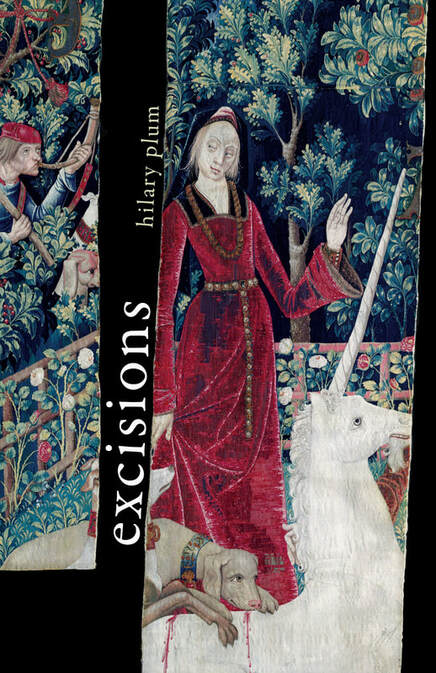
Out of hospitals, marriage bedrooms, woodland parks and city centers—the vanishing borders between the healthy and the sick—Hilary Plum’s poems emerge hard-edged and fully formed. She is dynamically attuned to the fragility and ferociousness of our attachments to one another, “a long storm of hello.” Densely lyrical and possessed of austere beauty, Excisions recalls the poetry of Jorie Graham, Victoria Chang and George Oppen, but Plum’s voice is her own—flinty, incantatory and undeniable.
DANIEL POPPICK
A compass works because our inner core, part crystal, contains intense pressure preventing iron from melting beyond the melting point. This is Excisions’ poetic consciousness. Repairing the illusion of mindbody disconnect, yet in this book there’s no word for cure or its tailspin outside of artistic reconnaissance. We’re at the hospital so much as to redraw transportation schemas—a gas guzzling gurney—one awakens from their dreams in a paper robe. The compass sword is in the nurse’s hand finding our bluest bulge of vein. Writing poems injected with needles, watching lines jump the color code. To be is to recognize intense stares from eyes who don’t yet exist totally inside. Outpatient futurity, and fugitivity, amidst exhaust in the winter street is the same evolutionary experience of the civilizational body. Together for a meal around the surgical table. Drugs are a mother’s love for her daughter amidst feudalism! Between poet and patient is warm sea foam from the moon’s unrest of having to be so old a witness! Plum’s transmissions from the funeral of Aesculapius surrealism. In Plum’s poems, the people with names dig up and brush off the bones.
DOT DEVOTA
EXCISIONS
Black Lawrence Press
April 2023
Order here
Some poems online at Cleveland Review of Books, Paperbark, TYPO, Territory, Sultan's Seal
Reading for Black Lawrence Press online here
On Writing Excisions:
I thought that if I wrote a book of poems I would be a writer in a more final way. Finally I would answer to something that had let me be more alive. I wrote prose poems that could be mistaken for emails and emailed them. I tried different shapes. I kept close a phrase from Lindsay Turner’s great translation of Ryoko Sekiguchi: Ghosts don’t need to arrange their meetings, but for you it’s still necessary. A sense of threshold: after death we won’t control our separateness from one another. We will join one another, by losing ourselves. Whether this is freedom is a tender question for the living. The dead know necessarily. This was a time in my life when I had to come to new terms with mortality, not my own. Our kitchen and backyard filled with friends who came to speak of mortality and of going on. One friend often stood in the night in the lit threshold of the kitchen, the door that opened onto a small patio, talking to me while I boiled alive the maggots who invaded our trash can and who were reborn, out of absolute nothing, by the hundreds each week. That summer an old-school hip-hop station had taken over the city. You could hear it, each song continuously playing through different doors as you walked down the street, from different cars at any stop sign. Then, in some corporate metamorphosis, it was gone, it became something Christian. We still remember it, we talk about what life was like then. I was looking for a syntax that could preserve the form of an inchoate emotion. The feeling of threshold. When something is excised from you, though it was you, you are what remains.
Black Lawrence Press
April 2023
Order here
Some poems online at Cleveland Review of Books, Paperbark, TYPO, Territory, Sultan's Seal
Reading for Black Lawrence Press online here
On Writing Excisions:
I thought that if I wrote a book of poems I would be a writer in a more final way. Finally I would answer to something that had let me be more alive. I wrote prose poems that could be mistaken for emails and emailed them. I tried different shapes. I kept close a phrase from Lindsay Turner’s great translation of Ryoko Sekiguchi: Ghosts don’t need to arrange their meetings, but for you it’s still necessary. A sense of threshold: after death we won’t control our separateness from one another. We will join one another, by losing ourselves. Whether this is freedom is a tender question for the living. The dead know necessarily. This was a time in my life when I had to come to new terms with mortality, not my own. Our kitchen and backyard filled with friends who came to speak of mortality and of going on. One friend often stood in the night in the lit threshold of the kitchen, the door that opened onto a small patio, talking to me while I boiled alive the maggots who invaded our trash can and who were reborn, out of absolute nothing, by the hundreds each week. That summer an old-school hip-hop station had taken over the city. You could hear it, each song continuously playing through different doors as you walked down the street, from different cars at any stop sign. Then, in some corporate metamorphosis, it was gone, it became something Christian. We still remember it, we talk about what life was like then. I was looking for a syntax that could preserve the form of an inchoate emotion. The feeling of threshold. When something is excised from you, though it was you, you are what remains.